spe.pdf.jpg)
Speaker or author: Jacobs, John S., 1815-1875
Newspaper or publication: National Anti-Slavery Standard
Overview of speech offered in protest of the Fugitive Slave Bill that was contributing to the kidnapping of nominally free black citizens of New York. Emphasis was placed on the recent experience in this regard of James Hamlet, who escaped after being kidnapped to be sold into slavery.
Description of file(s): PDF 1 page, 333 word document (text and image)
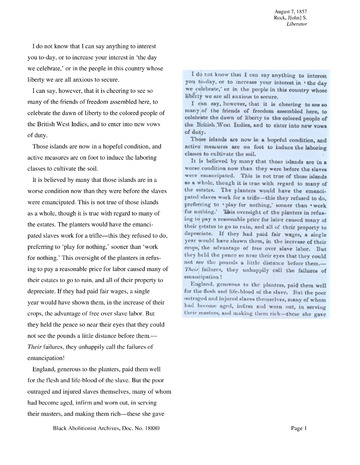
Speaker or author: Rock, John S. (John Sweat), 1825-1866
Newspaper or publication: Liberator
Speech given during the 23rd anniversary of the emancipation of the British West Indies. The speaker gave a brief overview of the current condition of the West Indies, and the work that still lies ahead for the population there.
Description of file(s): PDF 4 page, 914 word document (text and images)
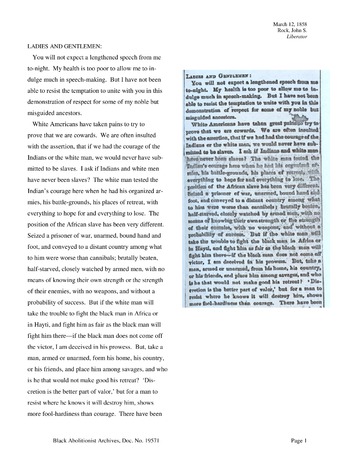
Speaker or author: Rock, John S. (John Sweat), 1825-1866
Newspaper or publication: Liberator
The speaker addressed the assertion that slaves lacked the same courage as white men or Indians or they wouldn't have allowed themselves to be slaves. The speaker asked if white men and Indians hadn't also been enslaved. If so, who can be said to have more courage or less? The speaker addressed several such irrational beliefs that were being offered regarding the essential nature of black Americans.
Description of file(s): PDF 8 page, 2,426 word document (text and images)
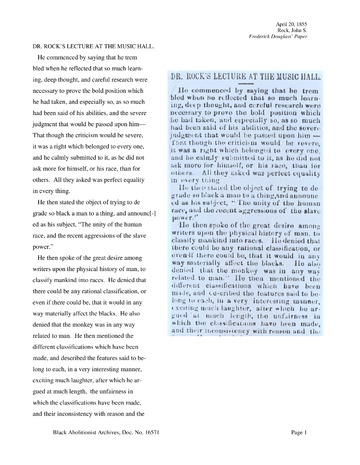
Speaker or author: Rock, John S. (John Sweat), 1825-1866
Newspaper or publication: Frederick Douglass' Paper
The speaker addressed the issue of categorizing human beings in terms of race. He noted how "...in undertaking to prove too much they prove nothing." He touched on the history of slavery and denounced the Fugitive Slave Law, predicting its downfall.
Description of file(s): PDF 6 page, 1,419 word document (text and images)
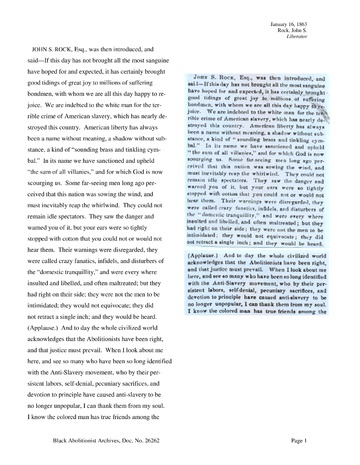
Speaker or author: Rock, John S. (John Sweat), 1825-1866
Newspaper or publication: Liberator
Speech given to celebrate the Emancipation Proclamation. The speaker rejoiced and offered thanks to all those who had sacrificed so much for this day.
Description of file(s): PDF 3 page, 790 word document (text and images)
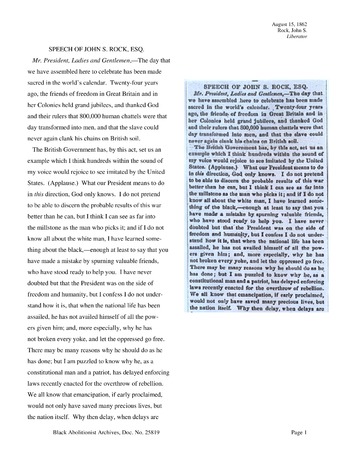
Speaker or author: Rock, John S. (John Sweat), 1825-1866
Newspaper or publication: Liberator
Speech delivered during a celebration of the August 1st anniversary of the emancipation of the British West Indies. The speaker noted that it was only a matter of time before the U.S. would also abolish slavery. He stressed the challenges of prejudice, lack of education and unemployment that lay ahead for African Americans when slavery is abolished in the U. S.
Description of file(s): PDF 11 page, 3,267 word document (text and images)
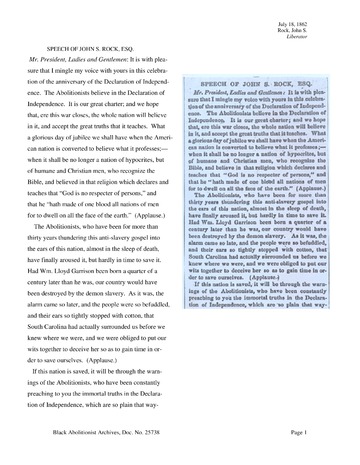
Speaker or author: Rock, John S. (John Sweat), 1825-1866
Newspaper or publication: Liberator
The speaker emphasized that the fight for freedom during the Civil War would be won through the work of the abolitionists. He then went on to praise two abolitionists in particular.
Description of file(s): PDF 11 page, 3,196 word document (text and images)
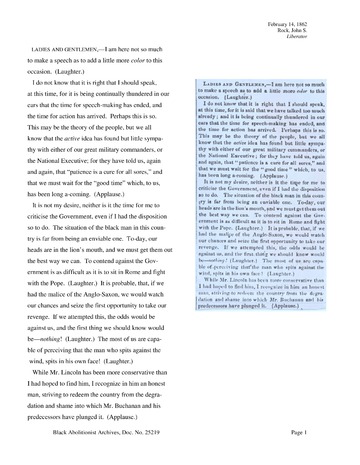
Speaker or author: Rock, John S. (John Sweat), 1825-1866
Newspaper or publication: Liberator
Speech regarding the influence the question of abolition has on decisions being made within the government during the Civil War. The speaker expressed his views about the war and its possible outcome.
Description of file(s): PDF 17 page, 5,123 word document (text and images)
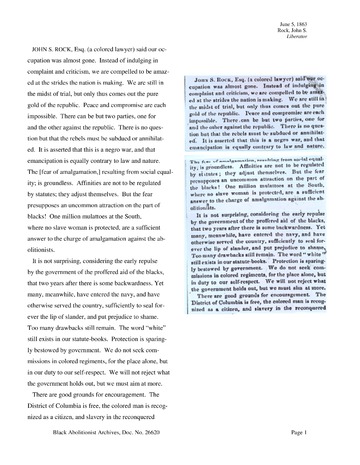
Speaker or author: Rock, John S. (John Sweat), 1825-1866
Newspaper or publication: Liberator
Brief speech addressing the fears expressed within the country regarding the emancipation of the slaves. The speaker emphasized that the fear of amalgamation is groundless since it presupposes an "uncommon attraction on the part of the blacks" to the white race and this was not the case. He encouraged his audience to have faith and trust the path to freedom that lay before them.
Description of file(s): PDF 2 page, 336 word document (text and images)
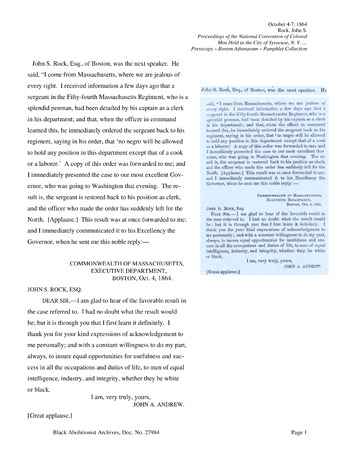
Speaker or author: Rock, John S. (John Sweat), 1825-1866
Newspaper or publication: Presscopy -- Boston Athenaeum -- Pamphlet Collection
The speaker made a plea for equal rights now that the slaves had been freed. He noted the heroism and patriotism displayed by black soldiers and emphasized the sacrifices they had made for liberty, freedom, and justice. All that they asked for at this point was to be granted the civil rights that every Union soldier had fought and died for.
Description of file(s): PDF 3 page, 892 word document (text and images)
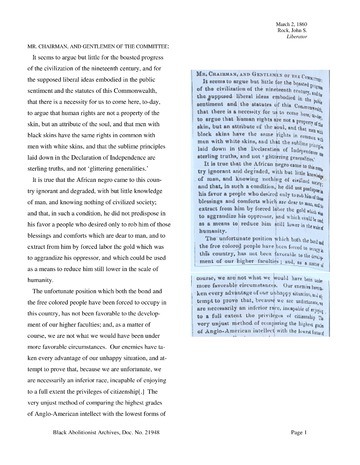
Speaker or author: Rock, John S. (John Sweat), 1825-1866
Newspaper or publication: Liberator
Eloquent speech addressing the influence of government legislation that implied prejudicial bias regarding race.
Description of file(s): PDF 8 page, 2,175 word document (text and images)
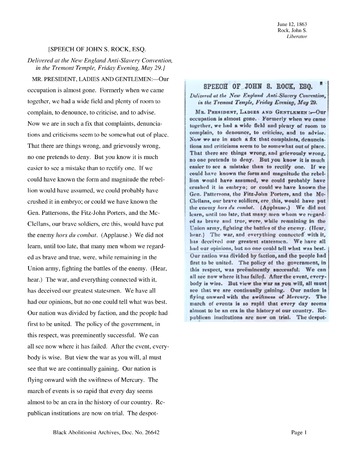
Speaker or author: Rock, John S. (John Sweat), 1825-1866
Newspaper or publication: Liberator
The speaker emphasized the economic impact of emancipation on a country that had become rich on the backs of its slaves. He spoke about the continued war and the battle that lay ahead for those who were now free. He encouraged patriotism among newly freed slaves and stressed that they were now fighting for their own country and their own freedom. He also addressed the issues of prejudice and fears of amalgamation.
Description of file(s): PDF 14 page, 4,083 word document (text and images)
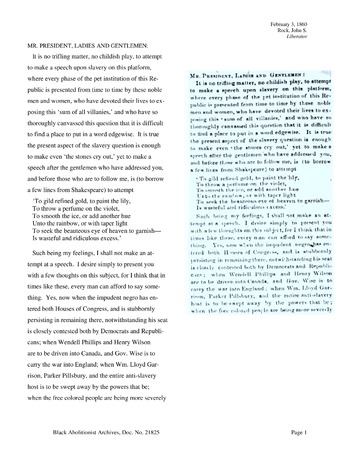
Speaker or author: Rock, John S. (John Sweat), 1825-1866
Newspaper or publication: Liberator
Speech addressing the current question of "what is to be done with the free colored people?" At the time, there were several issues regarding what would happen to the country if the slaves were set free. The speaker addressed the national fears; amalgamation; ideas regarding colonization or "removal"; and irrational concerns about violence. He assured his audience that both races were capable of living together in harmony.
Description of file(s): PDF 18 page, 5,281 word document (text and images)
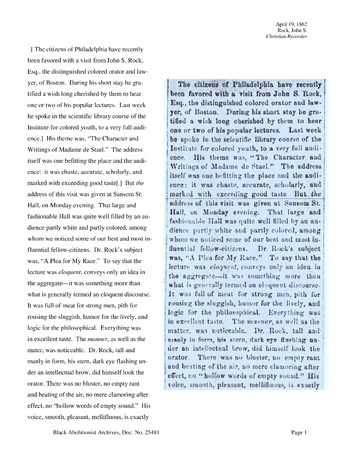
Speaker or author: Rock, John S. (John Sweat), 1825-1866
Newspaper or publication: Christian Recorder (1852 - 1856)
Brief overview of a speech regarding the refusal of the government to arm and accept as soldiers African Americans during the Civil War. This situation would alter as the war neared its end.
Description of file(s): PDF 2 page, 440 word document (text and images)

Speaker or author: Butler, Mrs. William H.
Newspaper or publication: Weekly Anglo-African (1859 - 1862)
Short speech in which the speaker encourages the members of the Clinton Lyceum to live in harmony and peace as the Civil War continues on around them. (Includes MP3 audio file.)
Description of file(s): MP3 spoken word audio recording
(page1).jpg.jpg)
Speaker or author: S.
Newspaper or publication: Northern Star and Freemen's Advocate (1842 � 18??)
The writer alerts his readers to the fact that even though the slave trade is now illegal, slaves continue to be transported from Africa to the U.S.
Description of file(s): one scanned newspaper column
(page1).jpg.jpg)
Title: Provincial Freeman - April 21, 1855
Speaker or author: S.
Newspaper or publication: Provincial Freeman (1853 - 1859)
The writer comments on a letter regarding Canadian immigration of fugitive slaves written by Mr. Gaines, U.S. politician. He emphasizes the discrepancies in Mr. Gaines' thinking and political rhetoric.
Description of file(s): three scanned newspaper pages (five columns)
(page1).jpg.jpg)
Title: Provincial Freeman - December 16, 1854
Speaker or author: S.
Newspaper or publication: Provincial Freeman (1853 - 1859)
The writer comments on an article by Mrs. Douglass' (possibly Sarah Douglass) that blames the problems of race relationships in the U.S. on amalgamation, the mixing of races through what she believes is illicit behavior. The writer notes that Mrs. Douglass assumes that if a man and woman are of different races that there couldn't possibly be love involved; one must be the victim of the other. Her article implies that people of African descent are too inferior to even be considered worthy of love from their white fellow human beings. The writer notes that this idea detracts from the real problem which is the system of slavery itself.
Description of file(s): two scanned, two columned, newspaper pages
(page1).jpg.jpg)
Speaker or author: S.
Newspaper or publication: Provincial Freeman (1853 - 1859)
The writer provides a brief overview of the president's message before Congress that focused mostly on events taking place in Greytown (probably Nicaragua).
Description of file(s): one scanned newspaper column
(page1).jpg.jpg)
Speaker or author: S.
Newspaper or publication: Provincial Freeman (1853 - 1859)
As conditions deteriorate in the U.S. for free African Americans, the idea of immigration to Canada seems more and more attractive.
Description of file(s): one scanned, two columned, newspaper page
(page1).jpg.jpg)
Title: Provincial Freeman - December 9, 1854
Speaker or author: S.
Newspaper or publication: Provincial Freeman (1853 - 1859)
The writer reminds his readers that even though the seasons change, poverty is always there, and always the same.
Description of file(s): one scanned newspaper column
(page1).jpg.jpg)
Speaker or author: S.
Newspaper or publication: Provincial Freeman (1853 - 1859)
The writer responds to an article published in another newspaper regarding the current debate over the idea of people of African descent immigrating to Canada.
Description of file(s): one scanned, two columned, newspaper page
(page1).jpg.jpg)
Title: Provincial Freeman - January 20, 1855
Speaker or author: S.
Newspaper or publication: Provincial Freeman (1853 - 1859)
The writer warns his readers of a scheme that may be underway in the U.S. to capture fugitive slaves as they reach the Canadian border.
Description of file(s): one scanned newspaper column
(page1).jpg.jpg)
Speaker or author: S.
Newspaper or publication: Provincial Freeman (1853 - 1859)
The writer discusses various political views on immigration, prejudice, and abolitionism currently held in the U.S. He informs his readers that some people who claim to be abolitionists and Emigrationists are actually motivated by a prejudice against those of African descent.
Description of file(s): two scanned, two columned, newspaper pages
(page1).jpg.jpg)
Speaker or author: S.
Newspaper or publication: Provincial Freeman (1853 - 1859)
The writer discusses the recent proposal by the state of Delaware to allow free African Americans to enter the state without being fined. This would revise the current law which forbids this. The writer points out that the state goverment is focusing on the potential economic advantages of this type of revision.
Description of file(s): two scanned newspaper pages (three columns)



